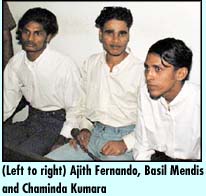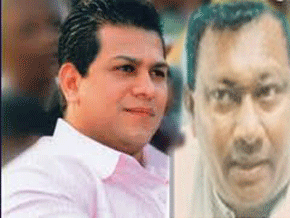A case for reviving the death penalty in Sri Lanka?
‘He that spares the bad, injures the good’ – Thomas Fuller–Gnomologia
‘Are you going to hang him anyhow-and try him afterwards.’– Mark Twain-Innocents at Home
The two foregoing statements by Thomas Fuller and Mark Twain depict two sides of the argument on the relevance of capital punishment.
The recent murder of Bharatha Lakshman Premachandra Presidential Advisor on Trade Union Affaires has brought
in to focus the necessity of the revival of the Capital punishment in Sri Lanka. In recent times the activities of the underworld including the drug trade seems to have escalated to unprecedented heights with powerful corrupt politicians taking the lead whereby the law enforcement agencies have been terrorized in to taking a back seat. Protests have been made by human rights activists regarding the re-activation of the death penalty, but these activists should also consider the supreme violation of the right to life of all those who become victims of such horrible crimes at the hands of heartless criminals, such as those who assassinated Justice Sarath Ambepitiya and Inspector of Police R. A. Upali, who was performing his official functions, mercilessly.
With the unfortunate, untimely and tragic demise of Justice Ambepitiya, who dispensed justice at all time without fear or favour, which has been described as the first such incident in Asia, the people of this country have been confronted with the stark reality of the impact that such an event could have on civilized society. The people have been undivided in condemning the dastardly act, which will be etched in our legal history as the most unfortunate incident ever to have occurred.
Those who appeal for mercy should also be merciful. Unfortunately, there appear to be persons born in human form, who are inhuman in their actions. Such persons cannot lay claim to the rights of a human being as by their very conduct they forfeit their right to such claims. A person who takes another’s life after executing a premeditated plan, without any enmity or any wrongdoing against such person on the part of the victim, constitutes a grave threat to society.
This does not mean that murder in any form should be condoned. The law provides the necessary safeguards to

May 31, 1999. The prisoners after they were convicted and sentenced to death for last year's rape and murder of an Indian bride. Rita Manoharan, 29, from Bombay, was on her honeymoon in Sri Lanka when she was abducted and killed last October. The three men (left to right) Ajith Fernando, Basil Mendis and Chaminda Kumara pleaded not guilty after a three judge bench of the Colombo High Court read out the verdict. Sri Lanka said in March that it resume executions, after a gap of 40 years, in a bid to curb rising crime. Photo taken from Sunday Times
persons who commit murders due to sudden and grave provocation etc. Some very gruesome murders have been committed in this country after the de-activation of the death penalty such as those of Saddepa Lakshan, an innocent child murdered in the course of an extortion attempt, Rita John, murdered brutally after a gang rape, Hokandara rape incidents and murders, Frazer Avenue murders and the murder of a mercantile executive in the presence of his wife and child to rob the luxury vehicle presented to him in appreciation of his hard work by his company etc.
It is said that the wife of the victim has been unable to speak due to the shock received in witnessing the said murder. What do the human rights activists say about the human rights of the victims of the said murders? Do they say that they regret these dastardly acts but the right to life of the brutal inhuman murderers should be protected, in order that such murderers could have the freedom to roam about in society after serving a few years in prison in order to repeat such dastardly criminal acts? It is time that such human rights activists learn to hold the scales of justice evenly in their hands as judges do.
Justice demands that punishment should be commensurate with the offence. Experience in the past has shown that reformation and rehabilitation is not possible of habitual killers with brutal instincts. Serial killings are an example of such inhuman instincts.
Although Sri Lanka is a country nurtured in the noble Buddhist traditions of forbearance and compassion, it is well-known that even during the times of the Sinhala kings deterrent punishments of a most terrible nature were meted out to criminals. It has been said that during those times a lady wearing all the gold ornaments could walk from one city to another without any harm\befalling her. In the present times a lady wearing a gold chain cannot walk on the road for a short distance without some drug addict or such person grabbing her simple gold chain, which may be her only valuable possession.
When the criminal who is convicted due to the evidence given by any witness is a member of an organized underworld gang or a terrorist group, the remaining members of such gangs and groups are bound to take revenge from informants and witnesses in order to deter anyone, who may engage in such activities against such gangs or groups in the future. In the recent past several such informants have been murdered in this country. Even if an attractive reward such as the reward offered in the case of the assassination of Justice Ambepitiya were to be offered, the informants would be in fear of their lives to come forward in the present situation, in the absence of effective witness protection procedures in place. A protection procedure should be put in place to protect the witnesses of terrible crimes, such as those found in the United States where the witnesses are even given refuge abroad subsequent to changing their identities so as to prevent identification by those seeking revenge.
The investigative procedures in the Police Department should be brought up to-date with the introduction of modern technological tools presently being used in such work in advanced countries. Police personnel should be given advanced training in such investigative work. It would be ridiculous to blame the Police for inefficiency in such investigations without the provision of the necessary advanced technological tools and trained personnel by the State. Fear of punishment in applications for violations of fundamental rights made by criminal elements against police personnel has become a deterrent in such investigations, some of which have come to a standstill due to such frivolous applications. In the writer’s opinion, such applications should be viewed in a proper perspective taking into consideration the greater public interest and safety in delivering judgements in such cases.
According to Amnesty International, 139 countries have abolished the death penalty. In 2010, only one country, Gabon , abolished the death penalty for all crimes. During 2010, 23 countries executed 527 prisoners and at least 2,024 people were sentenced to death in 67 countries. More than 17,833 people are currently under sentence of death around the world. (See: The Death Penalty Worldwide — Infoplease.com ) After 1978 Sri Lanka has not executed the death penalty.In Canada, Australia, New Zealand, Latin America, and Western Europe, the death penalty has become relatively unpopular, with the majority of the population opposing it (except in the United Kingdom) However certain cases of mass murder, terrorism, and child murder occasionally cause waves of support for reinstitution, such as the Robert Pickton case, the Greyhound bus beheading, Port Arthur massacre and Bali bombings, though none of these events or similar events actually caused the death penalty to be re-instated. Between 2000 and 2010, support for the return of capital punishment in Canada dropped from 44% to 40%, and opposition to it returning rose from 43% to 46% The Canadian government currently “has absolutely no plans to reinstate capital punishment.”
In abolitionist countries, debate is sometimes revived by particularly brutal murders, though few countries have brought it back after abolishing it. However, a spike in serious, violent crimes, such as murders or terrorist attacks, has prompted some countries (such as Sri Lanka and Jamaica ) to effectively end the moratorium on the death penalty. In retentionist countries, the debate is sometimes revived when a miscarriage of justice has occurred, though this tends to cause legislative efforts to improve the judicial process rather than to abolish the death penalty.
A Gallup International poll from 2000 said that “Worldwide support was expressed in favor of the death penalty, with just more than half (52%) indicating that they were in favour of this form of punishment.” A number of other polls and studies have been done in recent years with various results. In a poll completed by Gallup in October 2009, 65% of Americans supported the death penalty for persons convicted of murder, while 31% were against and 5% did not have an opinion In the U.S., surveys have long shown a majority in favor of capital punishment. An ABC News survey in July 2006 found 65 percent in favour of capital punishment, consistent with other polling since 2000. About half the American public says the death penalty is not imposed frequently enough and 60 percent believe it is applied fairly, according to a Gallup poll from May 2006. Yet surveys also show the public is more divided when asked to choose between the death penalty and life without parole,(life-imprisonment)or when dealing with juvenile offenders Roughly six in 10 tell Gallup they do not believe capital punishment deters murder and majorities believe at least one innocent person has been executed in the past five years. (Wikepedia)
For law and order to prevail the criminal justice system in this country should be reformed to deliver swift and deterrent punishments to heartless criminals. It appears from the recent escalating rate of murders in Sri Lanka , that the time has now come for the revival of the death penalty.

November 7, 2011 at 10:00 am
Swift Justice in Sri Lanka means always the wrong person will be accused and the real culprits including the military and the politicians will go scot free